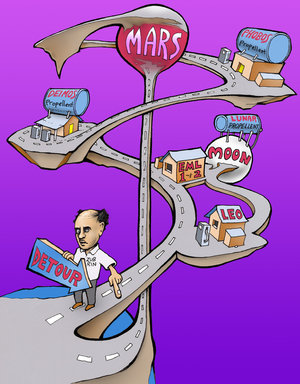I noted in my Popular Mechanics piece last week that Jeff Greason was “cautiously optimistic” that XCOR would have the funds in the next few months to complete Lynx.
Well, they have a press release out today that reveals what he was optimistic about:
The Yecheon Astro Space Center announced today that it has selected XCOR Aerospace as its preferred supplier of suborbital space launch services. Operating under a wet lease model, XCOR intends to supply services to the Center using the Lynx Mark II suborbital vehicle, pending United States government approvals to station the vehicle in the Republic of Korea.
…Working closely with its partners, Yecheon Astro Space Center has formed a broad coalition of regional and national entities to fund the approximately $30 Million project to bring the Lynx to Yecheon for space tourism, educational, scientific and environmental monitoring missions, making it the early leader in commercial manned space flight in Asia. Under the envisioned arrangement, Yecheon will be the exclusive Lynx operational site in Korea.
“As part of our long term strategic plan, we have performed an extensive review of the suborbital vehicle suppliers over the past 18 months, and found XCOR’s Lynx to be the best mix of safe design, reliable clean propulsion, skilled team members, full reusability, ease of operation, turn around time, upfront cost and long term cost to operate,” said Mr Jo Jae-Seong, Founder and Chief Executive Director of Yecheon Astro Space Center. “We look forward to a long term relationship with XCOR and Lynx!”
Note that the plan is to use a Lynx Mark II. In other words, while Virgin Galactic’s Will Whitehorn has run down the Lynx in the past, claiming that it didn’t really go into space, because it didn’t make it to a hundred klicks, the Mark II will, and the new plan is for there to be a single Mark I prototype/test-vehicle, with follow-on vehicles all being spacefaring Mark IIs. Jeff said that his schedule was funding constrained, but it looks now as though, as long as they hit their milestones, that constraint has gone away. That could mean Lynx flights in a little over a year, which means that they’ll be going head to head with Virgin, schedule wise, with much lower operational costs.
Of course, that doesn’t mean that only one company will emerge. They’re different approaches, with different markets, and the markets are large and diverse enough for both.
Of course, they may run into other schedule problems in the interim, perhaps not technical — I’m sure they had to already grease the ITAR skids to do this deal, but I can still imagine potential for it to throw some sand in the gears.
Anyway, this is really great news, on the 106th anniversary of the Wright Brothers first flight. I wonder if they chose the date of the announcement deliberately, or if it was just coincidence? There’s no mention of it in the release. Of course, the release has a date of 17th/18th, because it’s already tomorrow in Korea (as it often is in California), and Jeff is reportedly over there now.
For subscribers (and if you aren’t you ought to be) Charles Lurio has a lot more info at The Lurio Report.
[Update a few minutes later]
It’s worth pointing out that XCOR plans to spend an order-of-magnitude less money in development than Virgin does (thirty million versus at least two hundred million and probably more). This means that they’ll not only have lower operations costs, but also less development cost to amortize per flight. This shouldn’t necessarily be surprising, as Virgin has a much more ambitious project, carrying more passengers, with two vehicle types, plus spaceport investments. XCOR is more of a shoestring operation, with a single-passenger vehicle. And of course, both of them make the EADS estimate of a billion dollars to develop a European suborbital rocket plane look ridiculous.
[Late afternoon update]
Clark Lindsey summarizes some of the info from Charles’ newsletter. Also, go hit his tip jar, so that he can go keep doing what he’s been doing.
[Update a few minutes later]
OK, so it looks like the next couple of years are going to be very exciting in the suborbital reusable rocket world. We now have at least five serious players, with hardware being built and scheduled test flights coming up. We have two horizontal/horizontal (VG and XCOR, with the former two stage and the latter single stage) and three vertical/vertical (Armadillo, Masten and Blue Origin). Even with XCOR’s new deal, VG ang Blue remain the ones with the deepest pockets, and the least likely to fail due to capital constraints. Armadillo comes in next, though I suspect that John is starting to think seriously about looking for other peoples’ money, because while he’s wealthy, he’s no Bezos or Branson. It’s hard to know what Blue’s schedule is because they’re so secretive, but their recent agreement to fly payloads indicates that they plan to have a lot of air under the nozzle soon. Of the three vertical contenders, they’re probably furthest along in having a space-faring vehicle, because I don’t think that Armadillo or Masten have put serious resources into aeroshells yet, which will be a key development for them to leave the atmosphere.
Blue, Armadillo and Masten are closer in technical approach than any of them are to the others, or XCOR and VG to each other, though I’m sure that there are not-insignificant differences in propellant type, propulsion design, structure, etc. The really great thing is that we’re finally going to start to try lots of different things, and let the winners be sorted out by the market, instead of multi-million cost-plus simulations and trade studies. If NASA is smart, it will be buying lots of rides on all of them, just so that it can see how well the different approaches work, and to encourage innovation and diversity. But then, if wishes were horses…
